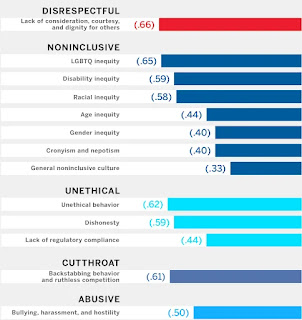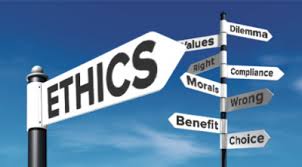D. Sull and C. Sull
MIT Sloan Management Review
Originally posted 16 September 21
Here are two excerpts:
What distinguishes a good corporate culture from a bad one in the eyes of employees? This is a trickier question than it might appear at first glance. Most leaders agree in principle that culture matters but have widely divergent views about which elements of culture are most important. In an earlier study, we identified more than 60 distinct values that companies listed among their official “core values.” Most often, an organization’s official core values signal top executives’ cultural aspirations, rather than reflecting the elements of corporate culture that matter most to employees.
Which elements of corporate life shape how employees rate culture? To address this question, we analyzed the language workers used to describe their employers. When they complete a Glassdoor review, employees not only rate corporate culture on a 5-point scale, but also describe — in their own words — the pros and cons of working at their organization. The topics they choose to write about reveal which factors are most salient to them, and sentiment analysis reveals how positively (or negatively) they feel about each topic. (Glassdoor reviews are remarkably balanced between positive and negative observations.) By analyzing the relationship between their descriptions and rating of culture, we can start to understand what employees are talking about when they talk about culture.
(cut)
The following chart summarizes the factors that best predict whether employees love (or loathe) their companies. The bars represent each topic’s relative importance in predicting a company’s culture rating. Whether employees feel respected, for example, is 18 times more powerful as a predictor of a company’s culture rating compared with the average topic. We’ve grouped related factors to tease out broader themes that emerge from our analysis.
Here are the 10 cultural dynamics and my take
- Employees feel respected. Employees want to be treated with consideration, courtesy, and dignity. They want their perspectives to be taken seriously and their contributions to be valued.
- Employees have supportive leaders. Employees need leaders who will help them to do their best work, respond to their requests, accommodate their individual needs, offer encouragement, and have their backs.
- Leaders live core values. Employees need to see that their leaders are committed to the company's core values and that they are willing to walk the talk.
- Toxic managers. Toxic managers can create a poisonous work environment and lead to high turnover rates and low productivity.
- Unethical behavior. Employees need to have confidence that their colleagues and leaders are acting ethically and honestly.
- Employees have good benefits. Employees expect to be compensated fairly and to have access to a good benefits package.
- Perks. Perks can be anything from free snacks to on-site childcare to flexible work arrangements. They can help to make the workplace more enjoyable and improve employee morale.
- Employees have opportunities for learning and development. Employees want to grow and develop in their careers. They need to have access to training and development opportunities that will help them to reach their full potential.
- Job security. Employees need to feel secure in their jobs in order to focus on their work and be productive.
- Reorganizations. How employees view reorganizations, including frequency and quality.
The authors argue that these ten elements are essential for creating a corporate culture that is attractive to top talent, drives innovation and productivity, and leads to long-term success.
Additional thoughts
In addition to the ten elements listed above, there are a number of other factors that can contribute to a strong and positive corporate culture. These include:
- Diversity and inclusion. Employees want to work in a company where they feel respected and valued, regardless of their race, ethnicity, gender, sexual orientation, or other factors.
- Collaboration and teamwork. Employees want to work in a company where they can collaborate with others and achieve common goals.
- Open communication and feedback. Employees need to feel comfortable communicating with their managers and colleagues, and they need to be open to receiving feedback.
- Celebration of success. It is important to celebrate successes and recognize employees for their contributions. This helps to create a positive and supportive work environment.
- By investing in these factors, companies can create a corporate culture that is both attractive to employees and beneficial to the bottom line.

















